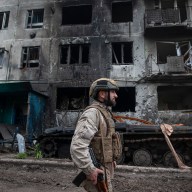As pens and legal pads have given way to laptops in the lecture hall, professors who are usually incensed by key tapping and the annoyances of technology have gradually adjusted — or at least accepted that such gizmos are here to stay.
The most innovative of the bunch have turned the distractions of technology to their advantage.
These tech-savvy educators are transplanting the classroom into the digital realm, shifting eager students into cyber-classes and shedding teaching limitations of the past.
Lyle Wetsch is one of those professors. Last year, he joined at least 10 other Canadian educational institutions inhabiting Second Life, an online virtual world, to teach an MBA class for students at Memorial University in St. John’s, N.L.
Interacting via his lifelike representation — called an avatar — Wetsch led students on virtual visits of the headquarters of major car companies. He also had virtual office hours and encouraged students to meet and practise presentations before the real deal.
“One of the advantages of education in the virtual world is you’re not limited to what you’re stuck with in the real world,” he said.
Indeed, entirely new demographics are being reached. Online learning opens doors for the sick, disabled and shy, to those living in remote areas or who are financially disadvantaged, and to students being home-schooled.
For students in grade school and high school, online tutoring is being offered for free through programs such as TV Ontario’s Ask a Teacher service, or for a fee by services such as newly launched TutorJam.
“There are students who for some reason got left behind,” said TutorJam founder Ajit Singh, who is also a professor at the University of Waterloo. “They cannot clearly state that they are not ‘getting it.’ And this tutoring service is right in the privacy of their homes, so kids can just open up.”
Loyalist College in Belleville, Ont., Canada’s first school to build a campus in Second Life, has used the platform successfully.
Following the terrorist attacks of Sept. 11, 2001, students hoping to become border guards saw their grades drop after practice sessions at the Canada-U.S. border were cut back.
The creation of a realistic simulation in Second Life provided a way for the students to attain the same skills. Students later tested in mock interview scenarios of people passing between countries saw their marks jump 28 per cent.
















